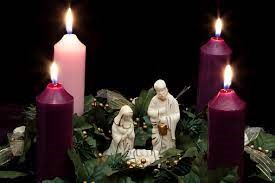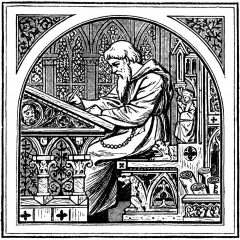
At a recent mid-week service (22nd November) I shared with the congregation my reflection on the forthcoming season of advent and the start of another church new year due the following Sunday. The historic significance of the date, November 22nd,became familiar to those with sufficiently long memories during the service. This helped underpin my theme expressed in the reflection, of the apparent paradox in our faith, in that we seem to put more emphasis on the Jesus story through the crucifixion than we do through the nativity. What follows is a summary of the reflection and interaction with those present using scripture readings from Isaiah 55:6-9 and 2 Corinthians 5:16-20.
On this day fifty-nine years ago, English literature lost two of its greatest 20th century titans. The first was Aldos Huxley b.1893, whose most famous work Brave New World was published in 1932. In it, Huxley warned of the dangers of moral anarchy in the scientific age and how we run the risk of becoming robotic in our lives where happiness is synonymous with subordination. What some of us would call becoming prisoners of the prevailing culture and if you look at the world around us we may have already in some cases reached that state. The second was C.S Lewis b.1899, whose broadcasts in the 1940’s proved popular and uplifting to a nation at war both on the home front and abroad and which became the basis for his book, Mere Christianity. His most famous work was arguably, The Chronicles of Narnia, which although dealing with realms of fantasy were underpinned by a strong Christian ethos and theology.
Yet both these deaths, momentous as they were occurring as they did on the same day, were overshadowed by another death which took place later that day in Dallas, Texas, the assassination of President John F. Kennedy. It has been said that people who were alive back then can remember exactly where or what they were doing when the news came through that Kennedy had been shot. (At this point I asked the congregation if any of them remembered, and several were able to recount their memories of that day and the feeling of shock about what had occurred. None of them however, remembered or even knew about Huxley and Lewis also dying the same day).
From my own generation’s perspective, most of us still have vivid memories of 9/11 and the Twin Towers disintegrating before our eyes over twenty-years ago and which likely will remain with us. For others in decades to come, the events of September 08th and the death of the late Queen will still hold their own vivid memories. It says something of our cultural attitude that our memories of JFK and other momentous events in our lifetimes owe more to death than to life. Politically JFK was not a particularly successful president even though his election in 1960 as the youngest ever president and first Roman Catholic, was supposed to usher in a new era for the United States (the Kennedy White House was regarded by some as a modern-day Camelot thanks to his glamourous first lady, Jackie Kennedy) but it had its failures. The Bay of Pigs disaster in 1961 when a US-backed coup against Cuban leader Fidel Castro failed, the following year the Cuban missile crisis which brought the world to the brink of nuclear war was resolved not by JFK, but by his brother Bobby and defence secretary Robert McNamara. Civil Rights which was to be the flagship policy of his administration did not get passed into law until 1965 by his successor as president, Lyndon Johnson. (I was reminded after the service by a member that JKF did found the Peace Corps which I had forgotten about). Students of political history aside, it is still notable that after six decades Kennedy’s presidency is still marked more by the manner of how it ended.
Huxley and Lewis while revered in their lifetimes, hardly rate a footnote now since they died other than in literary circles and among devoted fans. I find a similar paradox at work present in our faith. Christianity is founded on the death and resurrection of Jesus Christ which has resulted I feel, in a greater emphasis on the events surrounding the crucifixion rather than the nativity. In the Bible all four gospels carry detailed narratives of Christ’s death and resurrection with only minor differences and all include the four main characters: Jesus, Peter, Pilate and Mary Magdalene. However, the story of his birth is only described in two and of them, only Luke goes into any detail including the immaculate conception.
So here we are, in the week preceding advent when we anticipate and celebrate the coming of our Saviour into the world and yet the main story of Christianity owes more to his dying rather than how he lived. It seems everything is still predicated on the past tense.
Last week saw the beginning of Celtic Advent, the 40-day period of anticipation of Christ’s birth as celebrated by Celtic Christians which runs from November 15th to Christmas Eve night. As I have preached here and in other churches in the circuit previously, the Celtic Christians believed Christ appears three times in our lives, the first as a baby through Mary, then spiritually when we choose of our own free will to follow him and live according to his teachings and thirdly, in the second coming.
Recently I had a conversation with a Police Sergeant who is a practicing Muslim and who has not long returned from a private family pilgrimage to Saudi Arabia, among the places he visited was Medina, the burial place of the Prophet Muhammad. The Islamic faith teaches that Jesus will come again to sort the world out once and for all and having lived for a period of forty years, will die a natural death and be laid to rest in the spare grave that lies in Muhammad’s mausoleum.
Leaving aside the theological differences in the manner of Jesus’ life and death, Islam reveres Jesus as a mighty prophet and his mother Mary as the mother of the son of God. In the Holy Koran, Mary is mentioned at least forty times yet in our Protestant tradition she rates barely a dozen mentions. In recent decades however her reputation and that of Mary Magdalene has undergone something of a rehabilitation in raising the profile of both women in the Jesus narrative. Therefore we might ask, how or why do we find it difficult to try and place a greater emphasis than currently on the events of the Nativity?
Our reading from second Corinthians chapter 5 possibly offers a clue with verse 16 beginning with “We regard no one from a human point of view, even thought we once knew Christ from a human point of view, we no longer view him in that way.” Verse 17 says, “If there is anyone in Christ there is a new creation- everything has become new.” Here the apostle Paul speaks of a rebirth being offered but in a post-crucifixion context. Why can we not use the nativity and advent as a season to seek that re-birth, that new creation? Jesus died for our sins so we could be reconciled to God, could or should we not regard his birth as an opportunity also for reconciliation?
Taken literally it should not really matter at what point we enter the Jesus story, what is important is that we do. Since advent marks as it does the beginning of the church new year this coming Sunday and as we do seem to like making new year resolutions, we should also reflect on the words of our Old Testament reading this morning from Isaiah 55. Verse 6 says, “Seek the Lord while he may be found, call upon him while he is near.” This implies that anytime is the right time to seek him out and verse 7 sums up how we should ignore the wicked and their evil ways and resist with our every bodily fibre we possess, the prevailing culture of greed and violence we see today. We can only hope that by seeing our example of a life lived in Christ, they too may turn away from sin and seek the Lord who is always merciful.
We may not always understand verses 8-9 about how God’s thoughts and ways will always be higher than ours, but there is nothing to say we cannot renew our thinking and recognise that each new Advent like each Easter, will offer to all a chance of renewal in Jesus Christ, through his earthly birth and continuing in his spirit which lives forever in eternity.
There is no actually time like the present.
